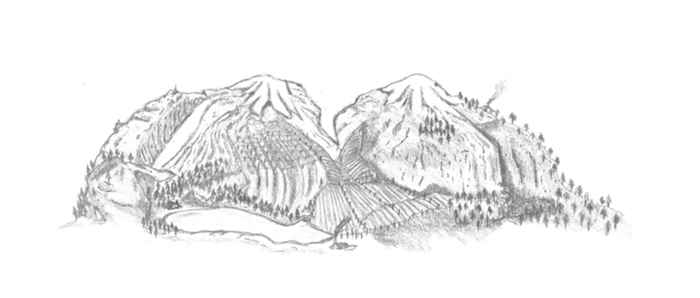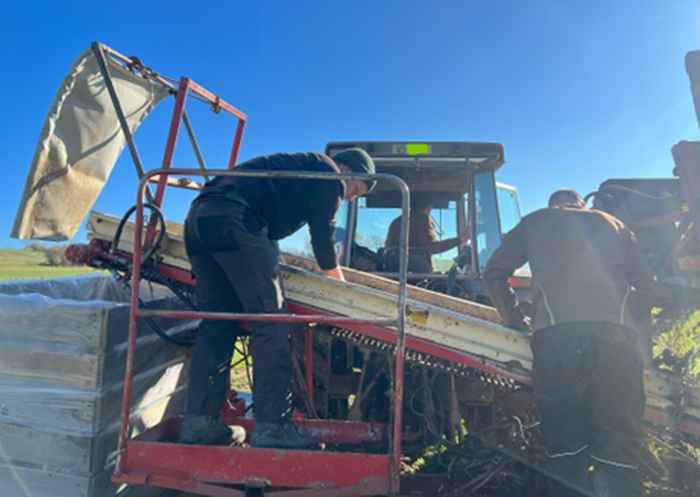“Wat de boer niet kent, dat eet hij niet” – Why This Saying Gets Farmers Wrong
by Simon Diener
4 November 2025

According to KNMI (Royal Netherlands Meteorological Institute) data from August 2025, this year ranks among the three hottest and driest 5% since 1901, worsening the challenges Dutch farmers faced earlier in the season. The dry spring revealed how severely drought can hit agricultural production, and water scarcity is becoming a growing concern. Yet just a few hundred kilometres away, Switzerland - often seen as Europe's “water tower” - is facing similar, and at times even more extreme challenges.
Switzerland has iconic blue lakes, glaciers, and lush mountain pastures. It stores about 6% of Europe’s freshwater reserves (FDFA, 2021). At first glance, this country seems well equipped to deal with climate pressures. However, the reality is different. Farmers are increasingly confronted with prolonged droughts, heatwaves, irrigation bans, dry pastures, and, paradoxically, heavy rains that flood fields and make work on fields impossible (Meteo Schweiz, n.d.). What was once unthinkable - a lack of water to feed cattle or grow crops - is now part of everyday farming life.
In my master’s thesis (Diener, 2024), I examined how Swiss farmers are adapting to these changes, focusing on their resilience – and more specifically on their adaptive capacity, or the ability of a system to adjust to medium- and long-term environmental shifts.
Resilience and local knowledge
According to resilience theory, a system is considered adaptive when it can live with uncertainty, draw on diverse knowledge systems, enable self-organisation, and support renewal (e.g. Folke et al., 2003). Within resilience theory and for the farmers with whom I worked, local environmental knowledge is essential.
Local environmental knowledge is experience-based knowledge that arises from everyday practice. It is holistic, encompassing not only individual aspects, but also the entire farm and the life of the farming family. It captures the nuances of microclimates, soil conditions, and seasonal changes. Let’s say you have lived over ten years in the same flat in a Dutch randstad. You might know at what time the closest Albern Heijn receives its deliveries, who sips a coffee every Sunday at the new café, where the pigeons usually flock the streets to eat bread crumbs, and at which street angle the wind is strongest during storms… Farmers develop a similar, intimate understanding of their land, built on lived experience.
While this kind of knowledge is often studied in the Global South (e.g. Jiri et al., 2016), it has received little attention in research on European or Swiss farming systems. This lack of research is striking - especially as many policy and governance frameworks in the Global North constrain the practical use of such knowledge.
The role of agri-environmental governance
Farmers do not develop their knowledge in isolation, alone on their farm. Rather, agricultural knowledge is shaped by political and economic frameworks, including systems of agri-environmental governance.
In Switzerland, agricultural practices are regulated by direct payments and label requirements. Anthropologist Jérémie Forney (2016) points out that farmers are increasingly becoming 'box tickers', spending more time on administrative compliance than on developing or applying environmental knowledge. This system does not encourage farmers to develop their own skills and knowledge to adapt to climate change.
This creates a paradox: local knowledge is essential for adaptation to climate change, but its relevance is declining in a system that emphasises standardisation over contextual learning. This tension motivated my research question:
- How do Swiss farmers use local environmental knowledge to adapt to climate change within the framework of Swiss agri-environmental governance?
Fieldwork in the Jura mountains
To explore this question, I conducted four months of ethnographic fieldwork in four neighbouring villages in the Jura vaudois. I worked alongside farmers, observed their daily routines, and conducted 13 in-depth interviews. Ethnography allowed me to capture how local knowledge is embedded in practice - something that standard interviews often miss.

Focusing on a small geographic area enabled comparisons between how farmers respond to the same climate challenges and revealed local dynamics of cooperation, divergence, and innovation. The farmers in my study represented a wide range of approaches - from conventional to organic, full-time to part-time - but they shared a common skill: navigating uncertainty.
Experience and experimentation
A central theme of my research was the role of experience and experimentation. Agricultural knowledge emerges through continuous cycles of observation, interpretation, evaluation, and action. Farmers work with nature - a system in constant change. This demands not just technical know-how, but what might be called the competence to “navigate through uncertainty.”
Although initial experiences are acquired in childhood, a deep understanding of how a farm functions typically emerges over time. This knowledge often manifests as small-scale, pragmatic experiments, such as testing drought-resistant grains like sorghum, sowing spring barley in autumn due to warmer winters, and adjusting the timing of seasonal alpine grazing to reduce pressure on feed resources.
These experiments follow a principle of learning by doing and doing by learning, where farmers are always evaluating their consequences. As one farmer puts it:
We change, but we don’t change everything at once. You change one factor, you decide once to change the cereal, once to do this.
Local knowledge needs recognition
Swiss farmers are constantly adapting. They integrate local knowledge with scientific insight, manage unpredictable conditions, and maintain their farms as complex social-ecological systems. But they face increasing pressure: economic precarity, bureaucratic demands, and a shrinking autonomy. This leaves little room for adaptation. As one farmer puts it:
But you have financial pressure, you have economic pressure, you don’t have time, but still you need to anticipate, you need to experiment, you need to try, because if you don’t try, you don’t get anywhere anyway.
If we as a society want resilient agriculture in times of climate change, we must begin by recognising and supporting local knowledge, not out of nostalgia, but because it is a vital resource for adaptation.
Returning to the proverb in the title, it's important to recognise that many farmers around the world are already embracing uncertainty and demonstrating a clear willingness to adapt. So rather than holding on to the old saying, why not speak with a farmer in your region and learn what they can teach you about navigating change?